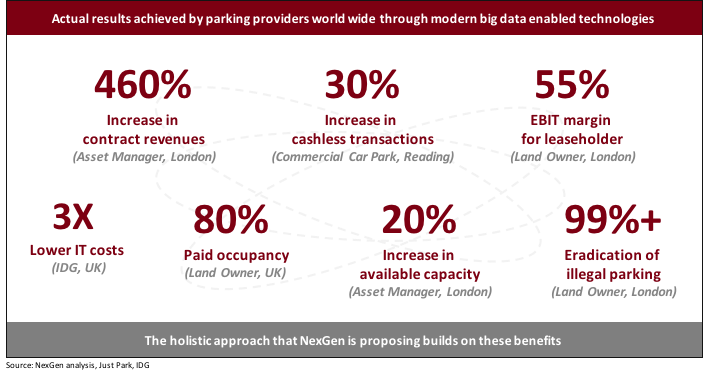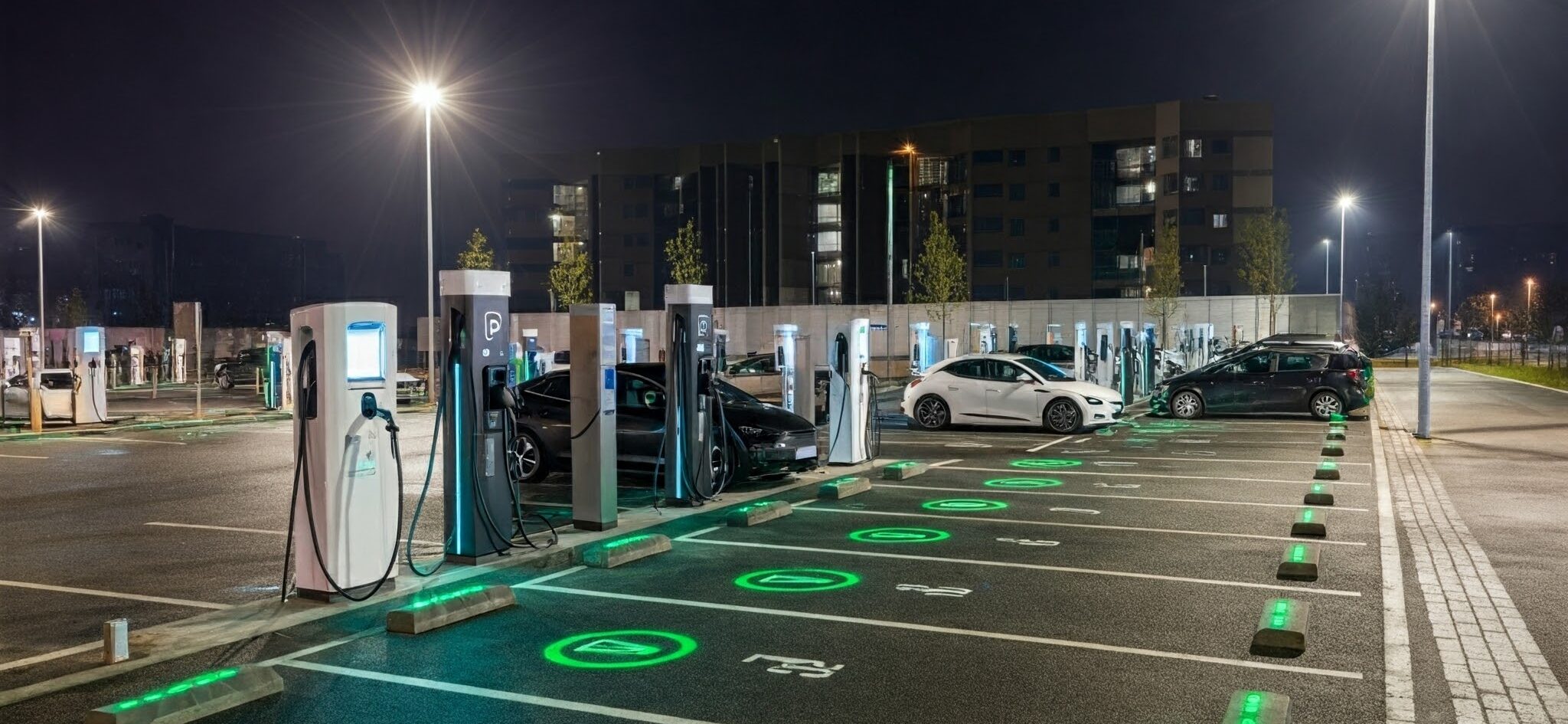I was recently invited to have an indepth look at the smart parking solutions of IDEX (https://www.idex.sa/) at the Saudi Intermobility Expo 2024 in Jeddah.
Having worked in smart city implementations for over fifteen years, one of my favorite examples to dig into has always been smart parking. From my perspective this is because parking has everything: the potential for horizon technologies, such as AI and blockchain, the use of robust technologies, such as advancements in cameras and sensors, and last but not least, it has the potential for direct revenue, which opens up a whole world of new operating models for cities and asset owners.
This got me back to one of my frequent discussions: what is the full value chain of any given smart or innovation initiative in construction, asset development and local government? So I’m starting a series on secret value chains of smart initiates right here with clever ways to temporarily store vehicles…the artist known as Smart Parking. Now this isn’t just a fancy upgrade—it’s a forward-thinking investment that future-proofs assets, streamlines operations, and positions brands as leaders in a rapidly evolving world.
When owners embrace smart parking technology, some benefits may be invisible, while others are impossible to ignore. In the long run, it’s about so much more than just parking. It’s about boosting capacity and usability while opening up exciting opportunities for new sustainable investments and revenue streams. Operational costs go down, the value of assets—both new and existing—goes up, and brands stand out as innovative leaders in the field. Operations become smoother, city initiatives are supported, and those sought-after international certifications become well within reach. And let’s not forget the potential of data monetization, which adds an entirely new layer of revenue possibilities.
Even in the short term, dipping a toe into smart parking with a small pilot project can make a world of difference. It’s the perfect way to validate a Smart Services Strategy while showcasing the efficiency of parking solutions to potential buyers or tenants. At the same time, it provides hard data to calculate ROI, making future investment decisions so much easier. And if certifications under local government or international smart initiatives are on your radar, a relevant smart parking project is a solid step in the right direction. Plus, having access to real-time data means you can make informed decisions about premium or reserved parking, adding even more value to the asset, area or city.
Now this sounds all bit pie in the sky so let’s go to the proof points that back up my story.
Back in 2016, yes this is how long I’ve been talking bout this (legacy never dies and all that), I quoted some of these facts at the Smart Parking UAE conference to general agreement:

So let’s dig into these proven benefits of smart parking and then look at further reasons to invest time and money:
- 460% increase in contract revenues were quoted by a parking asset manager in London, after implementing Just Park’s smart hardware, systems and app. That is what we mean we were talking about increased capacity. One parking place is no longer just counting as one space, just like the 17th century goldsmiths in England figured out they could issue promissory notes on more than the gold they actually held on deposit. The tech enables real time adjustment to pricing, advertising routing and other parameters that support greater usage of parking spaces.
- 30% increase in cashless transactions might sound like a non issue today, but it is still important in the sense that you are ensuring that the parking systems are fit for purpose for a digital world and specifically for the mobile payments world.
- 55% EBIT margin for stakeholders is where this whole gig shows you the money. All of the benefits we’ve talked about so far now add up to serious profitability potential. Of course you may not be providing parking for direct revenue, as is the case of some Malls and Stadia or public parks for example. However, this metric serves as an indicator of the increased efficiencies that do accrue to your end goals from implementing smart parking. For example, your goals may be seamless access to your assets or further transportation options, the fact that smartness could bring more revenue shows at least that it brings also more seamlessness.
- 3X lower IT costs might be one benefits that may have you scratching your head, how can putting in IT lead to lower IT costs?! The effect here is modernisation. Basically all systems that you would put in to manage parking will involve some kind of IT, what we are saying here is that using the latest technologies will actually save operational costs over time and may actually be cheaper to install.
- 80% paid occupancy: parking infrastructure and maintenance has to be paid for somehow, whether it’s directly through payment by the owner of the car being parked or by facilities owners such as through more rental. Either way investors in parking facilities want to know that their Investments are being fully utilized efficiently.
- 20% increase in available capacity: aside from Paid occupancy and other advantage of small parking is it actually increases the amount of space that’s available through efficient use of directions, Dynamic pricing, security gates and other initiatives. This means that whether you’re charging or not there is more space available for the end customer. At a macro level this can mean reduced investments in parking infrastructure as we can do more with less.
- 99% eradication of illegal parking: again whether the parking site is pay for or free the owners need to know that it is being used as intended and smart applications can deliver this while retaining a seamless experience for legitimate users.
In the immortal words of a British comedian from when I was growing up in the 80s…but wait, there’s more!
The benefits of integrating smart parking technology extend well beyond managing vehicles, offering unexpected perks that make a real difference. For instance, the increased density of surveillance cameras significantly reduces theft, adding an extra layer of security. But it doesn’t stop there—computer vision tools can help detect issues like illegal rubbish dumping, saving on cleaning costs, or even catching early signs of a fire, potentially minimizing damage before it escalates.
And then there’s the transformative impact on city planning. Take Montreal, for example—it’s the largest city in North America to eliminate mandatory minimum parking spots. They’ve been able to do this thanks to robust public transport, existing parking infrastructure, and forward-thinking AI-driven initiatives. Autonomous vehicles, which are constantly in use, drastically reduce the need for traditional parking spaces. Unlike private cars that sit idle most of the time, these vehicles keep moving, turning the dream of flexible parking into a reality. Parking doesn’t have to be fixed near a destination anymore; instead, it can adapt dynamically. Sure, there have been some teething problems, like that infamous night in Los Angeles where a fleet of autonomous taxis got stuck in an empty lot, honking at each other and keeping the neighbors awake—but hey, those are the kind of glitches we’ll laugh about once they’re ironed out.
On a more practical level, smart parking can also improve accessibility for handicapped users and deliver a seamless experience for VIP guests. And then there’s the exciting potential for value-added services. Parking is no longer just about leaving your car in a spot—it’s an opportunity to offer extras like EV charging, on-demand car washes, or even having your groceries delivered straight to your vehicle while you’re out shopping for your kid’s school uniform. This creates new revenue streams for parking owners, who can earn not just from the parking fees but also from partnerships with service providers.
In short, smart parking is reshaping how we think about urban mobility and infrastructure, turning parking lots into hubs of innovation and efficiency.
So when considering smart parking initiatives, think not what they can do solely for the parking location, but also what they can do for the whole triple bottom line of your organization, being financial, sustainable or cultural benefits. We are not just about deploying the latest tech, there are bigger reasons for them. The global benefits are the secret, not the direct value engineering price versus feature benefits.
—
The author, Andrew Rippon, is consulting on AI and Blockchain transformation in construction and government. He has implemented Sustainable Mobility inovations in Dubai and Saudi Arabia. The current subject he is working in is the implementation of AI LLMs in the process of procurement, with a focus on responding to RFPs including those for sustainable mobility.
